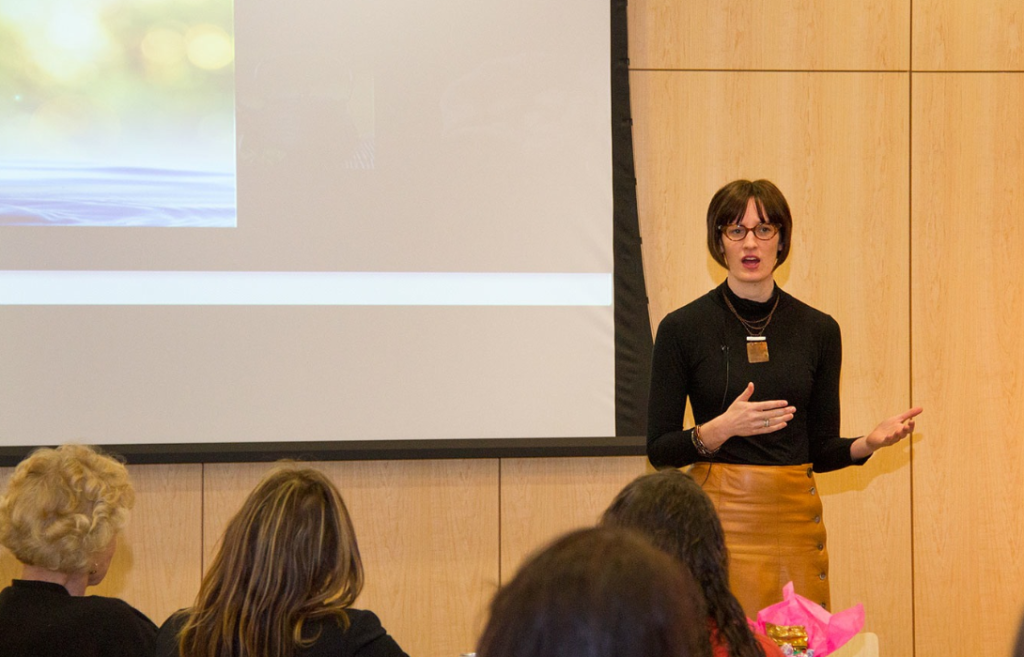Posted 8:07 a.m. Friday, April 25, 2014

“Sugar and spice and everything nice, that’s what girls are made of.” One UW-L professor explains how females really are closely connected with sugar.
 Ariel Beaujot, UW-L assistant professor of history, speaks during the annual Organization for Campus Women symposium.[/caption]
We’ve all heard the nursery rhyme “Sugar and spice and everything nice, that’s what girls are made of.”
Ariel Beaujot, UW-L assistant professor of history, explained how females really are closely connected with sugar — and have been throughout history — during an Organization for Campus Women Spring Symposium April 23 at UW-L.
Beaujot, a material culture historian, gave the lecture “10 Objects that Changed the World” during the symposium at Hall of Nations, Centennial Hall. Close to Earth Day, April 22, the lecture provided time to reflect on what people consume, explained Teri Talpe, president of OCW.
Beaujot focused on sugar, and how this seemingly unimportant object on coffee tables across America has shaped history.
Women’s consumption of sugar led to political change at a time when women couldn’t vote, she explained. Women first brought sugar into the home because it was listed in the recipes of cookbooks they used to bake delicious desserts.
But as sugar production grew, Europeans became afraid that all of their gold would go to the Middle East for sugar. They decided to grow their own by acquiring colonies in warmer climates, meaning sugar was one of the original reasons for colonizing the Americas and the Caribbean. And this commodity also became connected to the slave trade.
When word spread about the brutal circumstances of slavery to produce sugar, women refused to eat it. Women exerted their influence as consumers and demanded that slavery end immediately. It was not until the slavery abolition act of 1833 that slavery in most British colonies was abolished, she noted.
The sugar example shows how peoples’ daily consumption patterns link them to world history, says Beaujot. This is how Beaujot teaches a general education history course. She uses 10 material objects used every day —tea, coffee, sugar, cotton, silk, potato, beer, water, spices and Big Macs — to help students see history’s relevance today.
“Often people think of history as a dead discipline, one that studies things, people and phenomena that are long past,” says Beaujot. “But this method of studying everyday objects shows us that history is alive.”
Beaujot encouraged the audience — as she does her students — to think about how consumption choices made today can affect history tomorrow.
“What can we do based on what we’ve learned about sugar?,” Beaujot asked the audience. “Yes, we can vote. But we are also part of history. We can make social movements happen by making a decision.”
Beaujot is author of the book “Victorian Fashion Accessories.”
Ariel Beaujot, UW-L assistant professor of history, speaks during the annual Organization for Campus Women symposium.[/caption]
We’ve all heard the nursery rhyme “Sugar and spice and everything nice, that’s what girls are made of.”
Ariel Beaujot, UW-L assistant professor of history, explained how females really are closely connected with sugar — and have been throughout history — during an Organization for Campus Women Spring Symposium April 23 at UW-L.
Beaujot, a material culture historian, gave the lecture “10 Objects that Changed the World” during the symposium at Hall of Nations, Centennial Hall. Close to Earth Day, April 22, the lecture provided time to reflect on what people consume, explained Teri Talpe, president of OCW.
Beaujot focused on sugar, and how this seemingly unimportant object on coffee tables across America has shaped history.
Women’s consumption of sugar led to political change at a time when women couldn’t vote, she explained. Women first brought sugar into the home because it was listed in the recipes of cookbooks they used to bake delicious desserts.
But as sugar production grew, Europeans became afraid that all of their gold would go to the Middle East for sugar. They decided to grow their own by acquiring colonies in warmer climates, meaning sugar was one of the original reasons for colonizing the Americas and the Caribbean. And this commodity also became connected to the slave trade.
When word spread about the brutal circumstances of slavery to produce sugar, women refused to eat it. Women exerted their influence as consumers and demanded that slavery end immediately. It was not until the slavery abolition act of 1833 that slavery in most British colonies was abolished, she noted.
The sugar example shows how peoples’ daily consumption patterns link them to world history, says Beaujot. This is how Beaujot teaches a general education history course. She uses 10 material objects used every day —tea, coffee, sugar, cotton, silk, potato, beer, water, spices and Big Macs — to help students see history’s relevance today.
“Often people think of history as a dead discipline, one that studies things, people and phenomena that are long past,” says Beaujot. “But this method of studying everyday objects shows us that history is alive.”
Beaujot encouraged the audience — as she does her students — to think about how consumption choices made today can affect history tomorrow.
“What can we do based on what we’ve learned about sugar?,” Beaujot asked the audience. “Yes, we can vote. But we are also part of history. We can make social movements happen by making a decision.”
Beaujot is author of the book “Victorian Fashion Accessories.” 